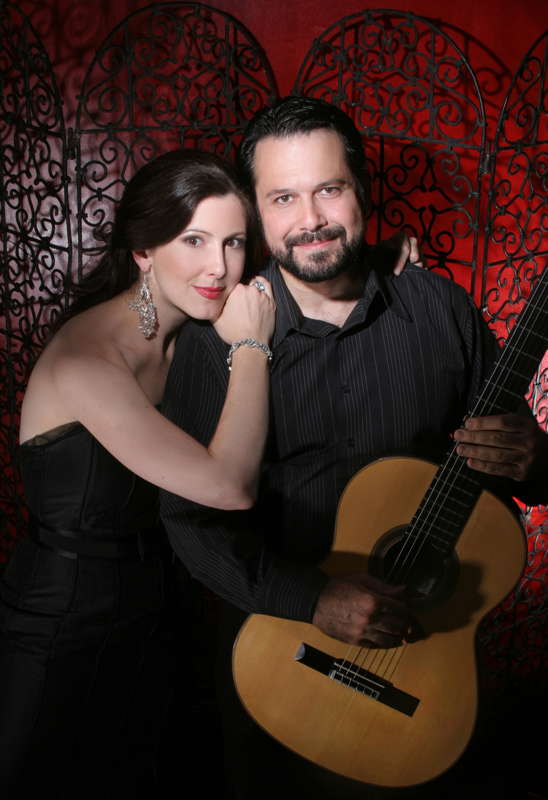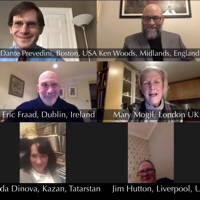 DISCUSSION: What is a work? John Dante Prevedini leads a discussion about The performing artist as co-creator, including contributions from Halida Dinova, Yekaterina Lebedeva, Béla Hartmann, David Arditti and Stephen Francis Vasta.
DISCUSSION: What is a work? John Dante Prevedini leads a discussion about The performing artist as co-creator, including contributions from Halida Dinova, Yekaterina Lebedeva, Béla Hartmann, David Arditti and Stephen Francis Vasta.
If The Night Grows Dark
Bright Shiny Things releases soprano Camille Zamora's
survey of four centuries of Spanish song
On 21 May 2020, Bright Shiny Things will release the CD If The Night Grows Dark (BSTC-0140), an overview of Spanish song - in both its early-music and traditional folk guises - arranged by its fervent twentieth-century apostle Graciano Tarragó, and brought to vibrant life by American soprano Camille Zamora and Turkish-born guitarist Cem Duruöz. The album includes three first recordings and features works by three sixteenth-century composers - Juan del Encina, Cristóbal de Morales and Miguel de Fuenllana. From the folk vein, there are traditional songs from many regions: Andalusia, Galicia, Asturias, Canaria, Salamanca, Castile, Catalonia, Mallorca, Euskadi (Basque Country), Santander and Extremadura.
The seeds of this album were planted, as Zamora relates in her lively, informative album note, in 'a dusty music shop on a side street' in Madrid, where she'd sought 'refuge from the midday sun'. There, she writes, 'I stumbled upon some out-of-print folios. My Texan-Spanish-New Yorker self recognized in the yellowed pages certain essential parts of my own musical makeup: the canciones my father sang to me as a child while accompanying himself on his guitar, the stories of my grandfather serenading my grandmother in his sweetly scratchy baritone, my very first classical album featuring Victoria de los Angeles singing zarzuela in her crystalline soprano ... Flipping through those old scores that afternoon and humming under my breath, I fell in love with the songs. I resonated with the light-dark Spanish sensibility built into the melodies ... the awareness of sorrow in joy and joy in sorrow.'
She left the shop that day with 'all the collections I could get my hands on', and in her subsequent closer look at the scores, one arranger's name kept recurring: Graciano Tarragó (1892-1973). 'Reading through his arrangements, I was struck by his gentle genius. Each song seemed an opera in miniature, a tiny window on a vast world of emotion, identity and story-telling. These were songs infused with duende - a word that 'could loosely be translated as "soul".' Tarragó, born in Salamanca, spent the bulk of his eight decades in Barcelona, where as a youngster he studied violin and guitar at the Conservatori del Liceu, to which, years later, he returned for a long career as a master guitar teacher. (Among his students was the teenage Victoria de los Angeles.) As an arranger, Zamora observes, Tarragó 'mined Spain's two particular motherlodes: its early-music treasury and its rich folk tradition. From these complementary veins, he forged an inimitably Spanish musical voice'. The soprano sums things up: 'Through song, Tarragó seems to say, we honor our heritage, our hearts, our teachers, those we've lost. Through song, we are restored, ultimately, to ourselves. Aun si la noche se hace oscura. Even if the night grows dark.'
Camille Zamora - hailed for her 'glowing sound' (Anthony Tommasini, The New York Times) and 'richly attractive voice' (Judith Malafronte, Opera News) - is a soprano who refuses to be categorized. A native Texan and a Juilliard alumna, she is as comfortable embodying Elle and Nedda in an intriguing double bill of La Voix humaine and Pagliacci as she is singing Rachmaninov and Robert and Clara Schumann in recital at Glimmerglass (where the late, illustrious Michael Kennedy, writing for Opera, thrilled to her 'intense communicative ability' and 'blazing passion'). Hailed as a leading interpreter of classical Spanish song by NBC Latino and the Congressional Hispanic Caucus, Camille has performed and recorded principal roles in the great zarzuelas, and her performances of classical Spanish repertoire have been heard in venues ranging from Carnegie Hall to Zimbabwe's Harare International Festival. She has performed with orchestras across the United States and collaborated with fellow artists as diverse as Yo-Yo Ma, Joshua Bell, Sting, The Mambo Kings and Jon Batiste. Her dual-role performance in Hindemith's The Long Christmas Dinner under Leon Botstein at Lincoln Center was widely acclaimed, and the subsequent CD release was chosen by Opera News as one of the Best Recordings of 2016. She is the co-founder of Sing for Hope, a multifaceted New York City-based 'artists' Peace Corps' that activates the creative arts as drivers of healing, learning and social cohesion, and presents initiatives - such as NYC's Sing for Hope Pianos in parks and public spaces - that make the arts accessible to all.

Camille Zamora and Cem Duruöz.
Photo © 2006 Devon Cass
Cem Duruöz won, aged seventeen, first prize in Turkey's National Guitar Competition before traveling to the United States to study at Stanford University and, later, at the San Francisco Conservatory, where he received a master's degree in guitar performance. Since then, he's performed widely, on four continents, with orchestras, chamber groups, singers and tango bands. In 2008, he gave the world premiere of the Concierto Anatolia, written for him by American composer David Hahn, as the climactic event of the International Guitar Festival in Round Top, Texas. His playing has been lavishly praised: American Record Guide's Music in Concert, for instance, hailed his 'flawless classical technique, depth of color, long flowing lines ... and tight rhythmic style', which had the audience 'listen(ing) in an entirely different way ... (as if) transformed'. Duruöz has released several acclaimed CDs and gives masterclasses worldwide. He currently teaches guitar performance at Connecticut's Wesleyan University.
Posted 15 May 2020 by Paula Mlyn

FURTHER INFORMATION: BRIGHT SHINY THINGS
FURTHER ARTICLES ABOUT SPANISH MUSIC



